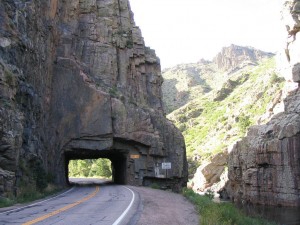If I had a nickel for every time I heard a sour story about I-70, I would likely be the richest person in Colorado. Running through the Rocky Mountains, this interstate is prone to the effects of avalanches, rockslides, and severe weather conditions, causing major delays and perturbing congestion.
The infamy is not unwarranted. Interstate 70 has a prolific history of road closures, horrific accidents, and falling boulders causing injuries, gridlock traffic, and fatalities affecting people traveling to major Colorado destinations like Denver and Vail. Just recently on the 4th, a pedestrian was killed on the interstate. According to the Vail Daily, this closed the road for three hours.
Commercial semi trucks and slope-bound tourists do not bode well together in this tricky terrain. Accidents are far too frequent. Trucks careen off the road and cars lose control. You cannot go a week without learning the news of an accident on Interstate 70.
A recent 9News report noted a commercial truck that careened off Interstate 70 and plummeted onto the road below, closing both the interstate and South Golden Road. Other similar commercial truck accidents have happened in the past.
The interstate is also notorious for its winter traffic jams and icy conditions. According to the Vail Daily, there were the most closures yet during the past winter. There were 117 closures due to commercial semi-trucks, totaling up to 203 hours of closure.
Don’t be deceived; it isn’t just bad weather that makes I-70 a dangerous spot. According to the Denver Channel, July has been the busiest month on this interstate for the past few years, especially through the Eisenhower & Johnson tunnels.
If your travel plans this summer include Interstate 70, calculate traffic and congestion into your travel estimate. Ready yourself as much as possible to make your travel through the Mountain Resort Region as seamless as possible.

